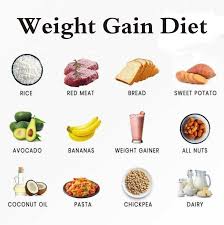Breakfast
- Oatmeal with Nut Butter and Fruits:
- 1 cup of oatmeal cooked in whole milk
- 1-2 tablespoons of peanut butter or almond butter
- 1 sliced banana or a handful of berries
- Boiled Eggs:
- 2-3 boiled eggs or scrambled eggs
- Smoothie:
- Blend 1 cup of full-fat Greek yogurt, 1 cup of whole milk, 1 banana, a handful of spinach, and a tablespoon of honey or maple syrup.
Mid-Morning Snack
- Trail Mix:
- A mix of nuts (almonds, walnuts, cashews), seeds (pumpkin, sunflower), and dried fruits (raisins, apricots)
- Greek Yogurt:
- 1 cup of full-fat Greek yogurt with a tablespoon of honey or granola
- Piece of Fruit:
- An apple, pear, or orange
Lunch
- Grilled Chicken or Tofu Wrap:
- Whole wheat wrap filled with 150-200g of grilled chicken breast or tofu, avocado slices, mixed greens, and hummus
- Quinoa or Brown Rice:
- 1 cup of cooked quinoa or brown rice on the side
- Vegetables:
- A side of steamed vegetables (broccoli, carrots, or green beans) drizzled with olive oil
Afternoon Snack
- Cheese and Whole-Grain Crackers:
- A serving of cheese (cheddar, mozzarella) with whole-grain crackers
- Protein Shake:
- Blend 1 scoop of protein powder, 1 cup of whole milk, a tablespoon of peanut butter, and ice
- Avocado Toast:
- 1-2 slices of whole-grain bread topped with mashed avocado, sprinkled with salt, pepper, and chili flakes
Dinner
- Salmon or Chicken Breast:
- 150-200g of grilled or baked salmon or chicken breast
- Sweet Potatoes or Whole-Grain Pasta:
- 1 cup of roasted sweet potatoes or whole-grain pasta with olive oil and herbs
- Salad:
- A large salad with mixed greens, cherry tomatoes, cucumber, olives, and a dressing of olive oil and balsamic vinegar
Evening Snack
- Cottage Cheese with Fruits:
- 1 cup of cottage cheese with sliced peaches or pineapple
- Nuts and Dark Chocolate:
- A handful of mixed nuts with a few squares of dark chocolate
- Milk:
- A glass of whole milk before bed
Additional Tips
- Add Healthy Fats: Incorporate healthy fats into your meals to boost calorie intake. Add olive oil to salads, use avocado in sandwiches, and include nuts in snacks.
- Include Protein with Every Meal: To support muscle growth, make sure each meal has a source of protein, such as lean meats, eggs, dairy, legumes, or tofu.
- Drink Caloric Beverages: In addition to water, drink smoothies, milk, and 100% fruit juices to increase your calorie intake without feeling overly full.
- Don’t Skip Meals: Ensure you eat regularly throughout the day, aiming for 3 main meals and 2-3 snacks to maintain a consistent calorie surplus.
1. Increase Caloric Intake
- Eat More Frequently: Consume 5-6 smaller meals throughout the day rather than just 2-3 large meals. This helps you intake more calories without feeling too full.
- Focus on Nutrient-Dense Foods: Choose foods that are rich in calories and nutrients. Examples include nuts, seeds, dried fruits, whole grains, avocados, dairy products, lean meats, and fatty fish.
- Include Healthy Fats: Incorporate healthy fats into your diet, such as those found in olive oil, nuts, seeds, avocados, and fatty fish. These are calorie-dense and help increase your overall intake.
2. Protein-Rich Foods
- Build Muscle with Protein: Ensure that each meal includes a source of protein to support muscle growth. Foods like eggs, lean meats, fish, dairy, legumes, and protein shakes are excellent options.
- Consider Protein Supplements: If you’re struggling to get enough protein from food alone, consider using protein powders or supplements, like whey or plant-based protein.
3. Strength Training
- Focus on Resistance Training: Engage in strength training exercises like weight lifting, resistance band workouts, and bodyweight exercises. This helps you gain muscle mass rather than just fat.
- Target Major Muscle Groups: Exercises like squats, deadlifts, bench presses, and rows work multiple muscles at once, helping you gain weight more effectively.
- Consistency is Key: Train consistently, aiming for at least 3-4 sessions per week, with proper rest days in between to allow for muscle recovery.
4. Stay Hydrated
- Drink Caloric Beverages: Along with water, include smoothies, milk, or fruit juices in your diet to add extra calories. Avoid filling up on low-calorie drinks like diet sodas.
- Stay Hydrated, But Don’t Overdo It Before Meals: Drinking too much water before meals can reduce your appetite, so it’s better to drink fluids after eating.
5. Get Enough Sleep
- Prioritize Sleep: Aim for 7-9 hours of quality sleep per night. Sleep is crucial for muscle recovery and overall health, and it helps regulate hunger hormones, which can affect your appetite.
- Maintain a Sleep Routine: Go to bed and wake up at the same time every day to ensure your body gets adequate rest.
6. Track Your Progress
- Monitor Weight and Adjust Diet: Regularly weigh yourself and adjust your calorie intake based on progress. Aim to gain around 0.5 to 1 pound per week, which is a healthy rate for most people.
- Keep a Food Diary: Record what you eat to ensure you’re consistently meeting your calorie and nutrient goals. This can also help identify areas where you might need to increase intake.
7. Reduce Stress
- Manage Stress Levels: High stress can affect your appetite and overall health. Engage in activities that help you relax, such as yoga, meditation, or spending time with loved ones.
8. Seek Professional Advice
- Consult a Dietitian: If you’re struggling to gain weight, consider consulting a dietitian who can tailor a plan specifically for your needs and ensure that your weight gain is healthy.
- Check for Underlying Health Issues: If you’re finding it particularly difficult to gain weight, it might be worth checking with a healthcare provider to rule out any underlying conditions that could be affecting your metabolism or appetite.
9. Be Patient
- Gaining Weight Takes Time: It’s important to be patient and consistent with your efforts. Healthy weight gain is a gradual process, and rushing it could lead to unhealthy eating habits.
By following these strategies, you can increase your weight in a healthy and sustainable way, focusing on building muscle and improving overall health.



